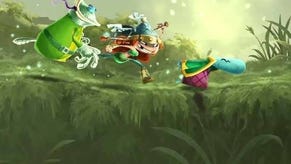Golden Generation: How FIFA Won the HD Era
From 2/10 to PES-killer, the story behind EA Canada's current-gen success.
"Really, to describe what EA has produced here as dreadful would be to do a terrible disservice to things that merely inspire dread."
As a statement of intent for the new HD generation of console hardware, FIFA's debut on Xbox 360 in 2005 could scarcely have gone worse for EA, FIFA 06: Road To FIFA World Cup hacked down in its 2/10 Eurogamer review, which added, with a kick to the groin: "It's not only awful, but it's also sabotaging everybody else's efforts at the same time".
Almost seven years on, it's hard to believe that game was produced by the same studio responsible for FIFA 13, which is showing all the signs of improving further on a wildly-successful formula now generally considered the best there's ever been.
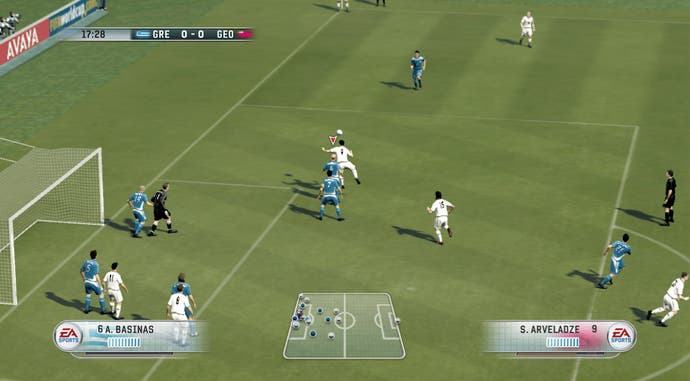
FIFA 06, it transpired, could be written off as an embarrassing, but ultimately meaningless pre-season friendly in which no-one could really be bothered, with the following year's proper update, FIFA 07, marking the true next-gen kick-off. And the significance didn't go unnoticed, EG's review noting: "EA has gone to far more effort than Konami in just about every way imaginable to improve its game". Game on - and a sign of things to come.
"We recognised at the end of the last generation the limitations of our game," acknowledges Matt Bilbey, a veteran of the franchise, these days the big cheese in charge of football for EA. "One of our engineers described it as like the Millennium Falcon: it was fast and could do a lot, but was actually kept together with Sellotape to some degree, with no potential to be the fastest in the future."
He adds: "Fortunately, we recognised that two or three years before PS3 and Xbox 360 came out. And we were fortunate at the time to be able to convince the company to give us the investment we needed to basically start from scratch."
"One of our engineers described it as like the Millennium Falcon: it was fast and could do a lot, but was actually kept together with Sellotape."
Matt Bilbey
In tandem with that the team was also rebuilt, with developers shipped in from all over the place, relocating - probably without too much persuasion required - to Vancouver, Canada to form what Bilbey calls "a global team that understood the game".
"I started working on FIFA 95 in the UK," he reveals. "Knowing the struggles we had then to get the company to support initiatives [compared to] now is night and day. I moved over here ten years ago originally as a marketer and I moved because you can come up with the most stupid idea in the world and someone will go, that's maybe not possible today, but it will be next year."
FIFA 08 took the series forward another step, adding in features such as Be A Pro, as FIFA finally began to turn even the most cynical of heads as a serious alternative to Konami's Pro Evolution Soccer - including that of David Rutter.
"I joined in August 2007, just as FIFA 08 was finishing, and took the reins for FIFA 09," Rutter recalls. "I joined the company as a pretty ardent PES fan, having spent many years looking at EA and the work they were doing and being somewhat dismissive of what was going on. But ultimately, when I came over for an interview and met the guys I realised there was something special going on within the studio."
Rutter, who previously managed the team at Championship Manager outfit Beautiful Game Studios, saw that FIFA was on the right track in the dressing room, but still had some way to go on the pitch. "The nuances in some areas hadn't quite delivered what the fans were after yet," as he puts it.
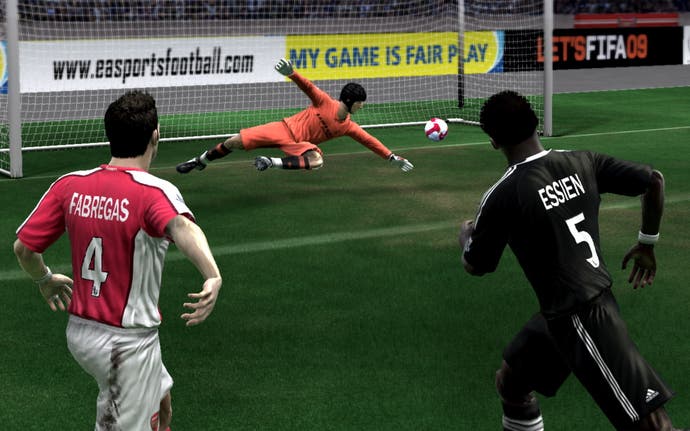
One of Rutter's first ports of call as the new 'face of FIFA' was back to his home country to meet with the UK press to, above all, find out where his studio was going wrong. It became clear that "responsiveness was going to matter more; the footballing and animation movement of the players we kinda had, but there wasn't enough 'snap' in the players.". It all sounds obvious in hindsight, but when you're already shifting copies by the million off the back of a licence, it's easy to take your eye off the ball.
"We set off to deliver that in FIFA 09, and since that point I guess what we've done is listen to what the fans have said, listened to what our guts and our hearts told us we needed to do, too, and became our own worst critics."
And these days, listening to fans also means engaging with them on Twitter, which Rutter does with cheery gusto, despite the abuse his position inevitably attracts.
"The problem with Twitter for me is we obviously have dates when we're going to reveal things, so it's difficult to not make people frustrated a lot of the time when you're on there, because they're asking questions I'm not really allowed to answer yet," he sighs.
"I joined the company as a pretty ardent PES fan, having spent many years looking at EA and the work they were doing and being somewhat dismissive of what was going on."
David Ruttner
"Some of them are ruder than others, and some of them are quite funny and entertaining in their rudeness. I don't really enjoy the physical, threatening stuff sometimes, but over the last five years I've probably gotten used to it. But that's not to say it's something I approve of." Play nicely, people.
From FIFA 09 onwards, most would agree - despite the annual promises of gameplay "revolution" from an ever-hopeful PR dept. - the series has continued to progress steadily and solidly along what is known internally as the FIFA "roadmap".
"I think we delivered on nearly everything we wanted to [in this generation]," claims Rutter. "It's a case of prioritising what we can get done in a year, or investing in over a year's worth of work where necessary - [FIFA 12's] Player Impact Engine was that for us."
From 09 to 12, key additions included: Ultimate Team, Live Season, Virtual Pro, 360 degree control, pro passing, tactical defending and precision dribbling. Although, taken as a whole, probably the biggest change in the way we now play video game football in this generation has been the massive shift online.
The team has its fair share of internal pressures, not least the dreaded "M" word - even if Rutter insists: "It's great having a really high Metacritic, but if people don't want to play it then it doesn't really matter". But FIFA clearly would not be the experience it is without its fierce - and at times, bitter - rivalry with PES.
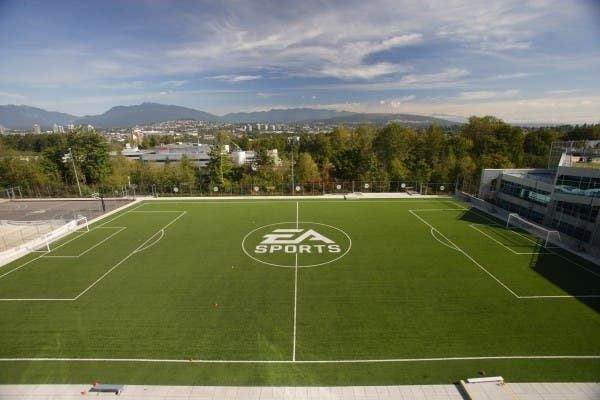
On this point Rutter is rather more diplomatic than his Konami counterpart. "We're pretty competitive about what we do, want to be the very best that we can, and we only have a year in which to do it," he says. "So to be alongside another team who are trying to do exactly the same thing and be better than us, kind of multiplies that competition - and I think that's a very healthy thing for the fans of the genre, because they basically get two teams of really skillful people trying to knock it out of the park every year".
Konami's troubles in the hardware cycle have been well-documented elsewhere, though gamers should now be encouraged that, after a reshuffle at the top, PES 2013 is showing great promise, and the company is further taking major steps to plan for the future, which includes opening a PES development studio in London. The balance of power shifted decisively in this gen; it could just as easily shift back again in the next.
With the word "executive" freshly added to his job title, Rutter now oversees not only the game, but the business around FIFA. Which has seen Nick Channon, another Brit, slip on the line producer kit for 13.
"If you believe what you read about what the next generation will be, online will be a big focus."
Andrew Wilson
"I've been making video games for 20 years and for me this is the ultimate role," says Channon. "It's like managing a Premier League team. I understand there's pressure with the role, and I take that very, very seriously, but it's an amazing role and I feel very fortunate to be in it. David's my boss so I work very closely with him, he's still very involved in our game."
Having now delivered the gameplay depth and nuance FIFA lacked a few years back, EA has created a new problem for itself: getting the average player to know any of that's there. The addition, then, of something as simple as Skill Games, could prove to be this year's most important feature.
"I think what the Skill Games will do is get you to know everything. The game is so much better when you know everything," says Channon, making the obvious point.
We've now reached that silly stage where everyone knows everyone's working on next gen stuff, but no-one's allowed to say anything about it, and it's Carry On nudges and winks all round. But let's have a go anyway.
"If you believe what you read about what the next generation will be, online will be a big focus," says Andrew Wilson, a former FIFA producer who these days occupies the EA Sports president's hotseat. "I think we are the strongest brand when it comes to online play - we have 25 million people playing 10 million games a day. We had record days of online play six months post-launch this past cycle.
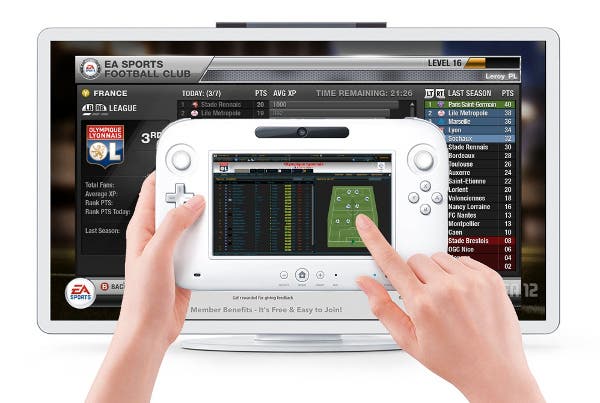
"When I look at what I read about what we believe this next generation might be, I think we're in a really, really good place. Certainly better than we were this time last transition."
"Whether it's in 20 years or two years I think people will want to pick a team and play against the computer or a friend," muses Rutter. "They'll want to pick a team and grow it into whatever kind of team they truly want, both online and offline. And those experiences will remain the fundamental foundations of FIFA for the future."
But what about the mad vision Matt Bilbey shared with me a few years ago, picturing a time when we'd watch a match on TV then pick up the controller to play the highlights at half-time in FIFA?
"We've got some crazy ideas around how people might be interactive with the sport and FIFA as a whole," says Rutter. "This concept of always wanting to engage in football and relive those moments in FIFA is always going to be there".
And wherever the technology leads us, we should never forget where all the best ideas really come from.
"The totally awe-inspiring part of what we do is the fact that every time you watch a football match, you see something that you've never seen before," Rutter notes. As a Man Utd fan still broken after last season's climax, I can't disagree.
"To have that level of source material to be able to call upon at any time - it's amazing."
Football: the beautifully unpredictable game.



